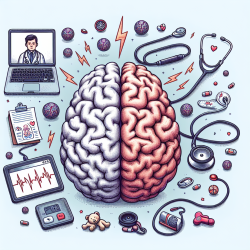Introduction
In the field of pediatric neurology, epilepsy remains a prevalent concern, affecting approximately 1% of the global population, with a significant number of cases emerging during childhood. Recent research has started to shed light on the role of brain inflammation in the development of epilepsy, offering new avenues for therapeutic interventions. This blog aims to distill the findings from the research article "Role of Brain Inflammation in Epileptogenesis" and provide actionable insights for practitioners looking to enhance their therapeutic approaches.
The Link Between Inflammation and Epilepsy
Historically, the central nervous system (CNS) was considered an immunoprivileged site, shielded by the blood-brain barrier (BBB). However, recent findings indicate that inflammatory and immune reactions do occur within the CNS, potentially contributing to epileptogenesis. Inflammation, characterized by the activation of microglia and astrocytes and the production of proinflammatory cytokines, has been observed in both human epilepsy patients and experimental models.
Implications for Pediatric Epilepsy
Understanding the inflammatory processes involved in epilepsy can significantly impact the management of pediatric epilepsy. Key takeaways from the research include:
- Microglial Activation: Microglia, the brain's resident immune cells, become activated in response to seizures, potentially contributing to neurodegeneration. Targeting microglial activation could be a promising therapeutic strategy.
- Astrocytic Response: Astrocytes play a critical role in maintaining the BBB and regulating neurotransmitter levels. Their activation during seizures can exacerbate neuronal excitability, suggesting that modulating astrocytic activity could help manage epilepsy.
- Cytokine Involvement: Proinflammatory cytokines such as IL-1 and IL-6 are elevated in epilepsy, influencing neuronal excitability and survival. Anti-inflammatory treatments targeting these cytokines may offer new therapeutic avenues.
Practical Applications
For practitioners, these findings underscore the importance of considering inflammation as a factor in epilepsy management. Here are some practical steps to integrate this knowledge into clinical practice:
- Early Intervention: Identifying and treating inflammation early in the course of epilepsy could prevent the progression to chronic epilepsy.
- Anti-inflammatory Therapies: Consider incorporating anti-inflammatory treatments, such as corticosteroids or ACTH, particularly in cases of intractable epilepsy.
- Collaborative Research: Engage in collaborative research efforts to further explore the role of inflammation in epilepsy and develop targeted therapies.
Encouraging Further Research
While significant progress has been made, further research is essential to fully understand the mechanisms by which inflammation contributes to epilepsy and to develop effective interventions. Practitioners are encouraged to stay informed about the latest research developments and consider participating in clinical studies to advance the field.
To read the original research paper, please follow this link: Role of Brain Inflammation in Epileptogenesis.










